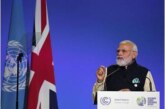By Dr. Arvind Kumar, President, India Water Foundation
“The world has long benefited from the strong, collaborative engagement with the government and the people of the United States…It is WHO’s wish for this collaboration to continue,” WHO Director General Tedros Ghebreyesus”
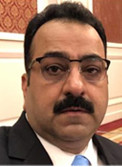 Around 76,69,317 confirmed cases of COVID-19 infections, out of which 20,16,027 have been recorded in the US alone, according to the Johns Hopkins University’s coronavirus tracker. On the other side of the coin, Donald Trump notified the WHO on ‘permanent freeze’ U.S. funding of the U.N. agency and reconsider membership unless it committed to major reform within the next 30 days. The specialized agency has been accused of being ‘china-centric’ and failing to bring required reforms at the earliest. Is COVID-19 crisis challenging United Nations, which also serves as the bedrock of global governance of a number of issues, including climate change? Few opined about the allegations on UN’s stance towards one country in regard to the one belt one road initiative. Though according to UNESCAP study “On the social front, displacement and marginalization of local communities and indigenous groups is possible as a result of land grabbing and changing communities. Similarly, workers in industries that will no longer be competitive after opening up of markets could be marginalized. Poor working conditions, especially for migrant workers and construction workers in remote areas, are also a concern.”
Around 76,69,317 confirmed cases of COVID-19 infections, out of which 20,16,027 have been recorded in the US alone, according to the Johns Hopkins University’s coronavirus tracker. On the other side of the coin, Donald Trump notified the WHO on ‘permanent freeze’ U.S. funding of the U.N. agency and reconsider membership unless it committed to major reform within the next 30 days. The specialized agency has been accused of being ‘china-centric’ and failing to bring required reforms at the earliest. Is COVID-19 crisis challenging United Nations, which also serves as the bedrock of global governance of a number of issues, including climate change? Few opined about the allegations on UN’s stance towards one country in regard to the one belt one road initiative. Though according to UNESCAP study “On the social front, displacement and marginalization of local communities and indigenous groups is possible as a result of land grabbing and changing communities. Similarly, workers in industries that will no longer be competitive after opening up of markets could be marginalized. Poor working conditions, especially for migrant workers and construction workers in remote areas, are also a concern.”
Post World War I saw the formation of League of Nations to regulate the world order. In the aftermath of World War II, the League was dissolved and United Nations was established. Following the establishment of the United Nations in 1945, global politics entered a new era with the victorious powers of World War II in a position to help shape the norms, values and institutions of international relations. From the Paris climate accord, the Iran nuclear deal, and Trans-Pacific Partnership, USA administration has reduced funding and disengaged from the United Nations bodies such as UNESCO and UN Human Rights Council while paralyzing the World Trade Organization. Upsetting the NATO allies, Trump has questioned the alliance’s core commitment towards mutual self-defense.
Has withdrawal or freezing put a question on human kind?
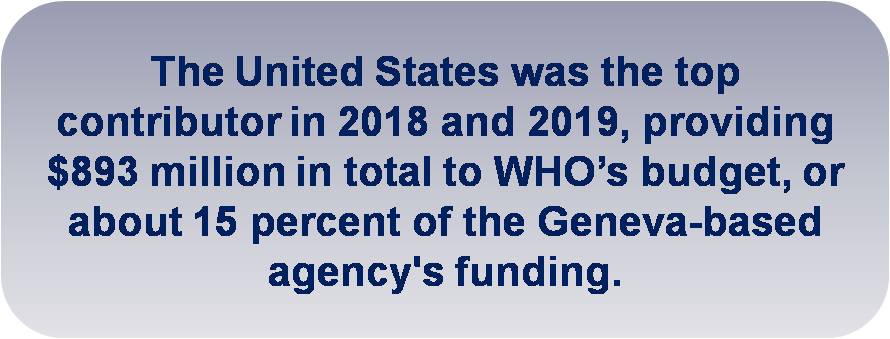 Cutting off U.S. funding would deal a heavy blow to the WHO. The United States was the top contributor in 2018 and 2019, providing $893 million in total to WHO’s budget, or about 15 percent of the Geneva-based agency’s funding. The US has announced its withdrawal of funding the World Health Organization, now leaving the Melinda Gates Foundation as the largest contributor, which is a non-state actor, followed by United Kingdom.
Cutting off U.S. funding would deal a heavy blow to the WHO. The United States was the top contributor in 2018 and 2019, providing $893 million in total to WHO’s budget, or about 15 percent of the Geneva-based agency’s funding. The US has announced its withdrawal of funding the World Health Organization, now leaving the Melinda Gates Foundation as the largest contributor, which is a non-state actor, followed by United Kingdom.
Trump’s “America First” mentality has already proven its deleterious impact on global warming and free trade. The head of the World Health Organization indirectly urged President Donald Trump to reconsider his decision to pull the United States out of the U.N. agency over its allegedly “China-centric” stance. It would also worsen deficit in global health governance. This pandemic has already exposed the inadequacies of public health infrastructure across countries, also revealed the vulnerabilities of human society to novel diseases. Confronted with more complex challenges, the WHO has been facing a chronic shortage of funds, resources, and staff. In such a scenario, is the withdrawal of funds justified?
Experts like Ashish Jha, director of Harvard’s Global Health Institute highlights that “U.S. has played an outsized role in global health across a range of issues, and I think its absence at the WHO would really harm the organization”. Similarly, European Union backs the WHO in its efforts to contain and mitigate the COVID-19 outbreak and has already provided additional funding to support these efforts.
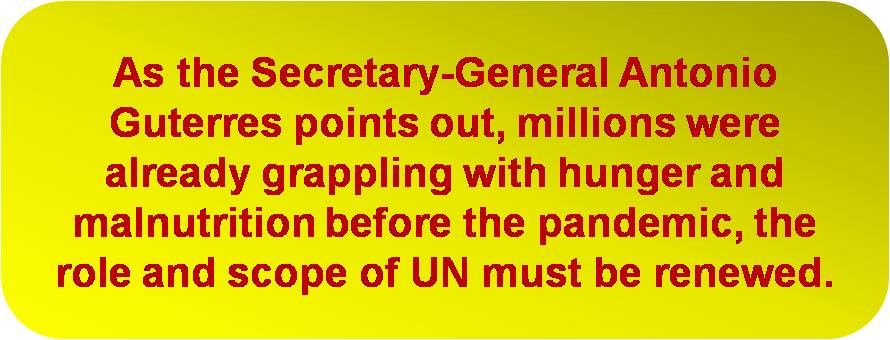 As the Secretary-General Antonio Guterres points out, millions were already grappling with hunger and malnutrition before the pandemic, the role and scope of UN must be renewed.
As the Secretary-General Antonio Guterres points out, millions were already grappling with hunger and malnutrition before the pandemic, the role and scope of UN must be renewed.
A new democratic Face-lift : THINK Different, ACT Now
Despite all its shortcomings, the U.N. appears to be the most legitimate international institutional setting in which countries of different power capabilities, geographical locations, national identities and political values have a potential voice and choice. United Nations and its specialized agencies should preserve its commitment to the U.N.’s multilateral and consensus-oriented spirit. Previously, United Nations was successful in fighting diseases like Ebola, SARS and other emergencies, helping to preserve order and security, achieve sustainable development, improve human rights, to protect global peace and security, protect the global environment, and reducing poverty and hunger are the U.N.’s core task and most importantly, COVID-19 is the pressing issue of our times.
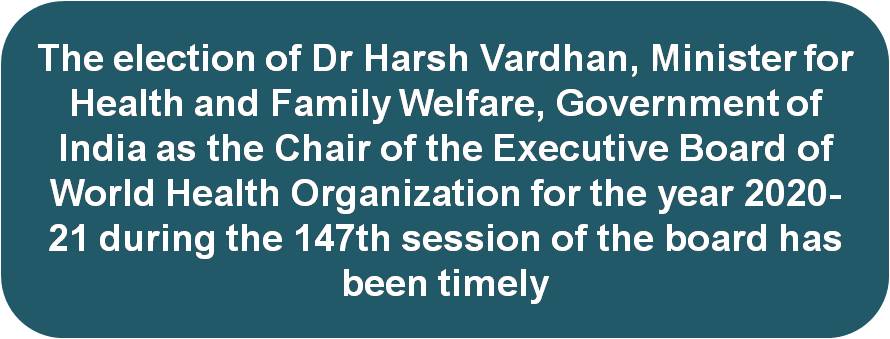 Not only the U.S. but also other rich members of the U.N. should contribute more to the U.N. budget. Different U.N. organs and agencies should be redesigned in such a way to make more room for the emerging/rising powers of the non-Western world. The U.N. should reflect the emerging power dynamics of today’s world and countries like Germany, India, Japan, Brazil, Turkey and other rising powers can give an extra edge to the United Nations. The election of Dr Harsh Vardhan, Minister for Health and Family Welfare, Government of India as the Chair of the Executive Board of World Health Organization for the year 2020-21 during the 147th session of the board has been timely. As board chair he spoke “We have to work to realize the collective capacity of all our member nations and to build a heroic collective leadership.” Under his stewardship, India shall foster the need for higher commitments in respect of pandemic & other diseases, collaborations for partnerships, drawing a roadmap to address global shortages of medicines and vaccines, and most importantly, the need for internal reforms.
Not only the U.S. but also other rich members of the U.N. should contribute more to the U.N. budget. Different U.N. organs and agencies should be redesigned in such a way to make more room for the emerging/rising powers of the non-Western world. The U.N. should reflect the emerging power dynamics of today’s world and countries like Germany, India, Japan, Brazil, Turkey and other rising powers can give an extra edge to the United Nations. The election of Dr Harsh Vardhan, Minister for Health and Family Welfare, Government of India as the Chair of the Executive Board of World Health Organization for the year 2020-21 during the 147th session of the board has been timely. As board chair he spoke “We have to work to realize the collective capacity of all our member nations and to build a heroic collective leadership.” Under his stewardship, India shall foster the need for higher commitments in respect of pandemic & other diseases, collaborations for partnerships, drawing a roadmap to address global shortages of medicines and vaccines, and most importantly, the need for internal reforms.
Every September, within the framework of the U.N. General Assembly, all U.N. members gather in New York to discuss global issues of concern as well as share ideas on how to restructure the U.N. to make it more adaptive to the current dynamics of global challenges. This platform can be leveraged to bring inclusive suggestions and reforms. Further, U.N. should be restructured in such a way to bring more accountability and responsibility; make more room for non-state actors like civil society, NGOs and think-tanks in their efforts to steer the course of international developments as well as offering solutions to global challenges. For instance, Bill and Melinda Gates Foundation have a long history of engagement with WHO on various healthcare projects, such as Polio eradication.
With the crisis unfolding into uncertainty and insecurity, the importance of showing solidarity and cooperation is right to make right decisions and with close cooperation with UN, we can ensure to work together; enhance resilience and support recovery amidst COVID. USA must also re-think in this regard since the entire globe is facing challenge of saving lives and livelihoods.
There are no definitive answers but must be certainly debated more frequently in the coming days as the world reels under the COVID-19 crisis and tries to outlive it. Our efforts towards fighting present pandemic and future humanitarian challenges need the revival of international organizations. Let’s begin right from United Nations.



